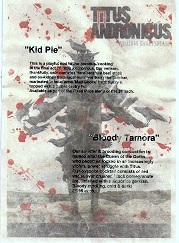
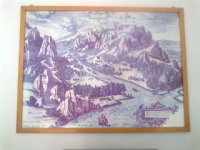
We left Guesthouse Euridiki very early on St Paraskevi's day. Goodbye to our hostess, and her quiet husband. Goodbye the cool, hushed lobby with the ranked preserves and the craft goods nobody bought; goodbye Elia's Corner. By ten thirty we'd reached Sacred Dion, at the foot of Mount Olympus. One more Macedonian city, but not an architect designed show-off from the World Domination years, like Pella: a city that just grew, the way proper cities ought, around the national shrines. A lovely, unexpected place. The ruins, mostly Graeco-Roman, first century CE, inhabit a shady wetland, hopping with bright green frogs. The deities, Demeter, Zeus, Afrodite, have been replaced (effigies of effigies) just as they were found:
small, not gigantic, presiding over the dragonflies. In the museum where the originals are kept we saw portrait statues of ordinary bourgeois, men and women, neither royal nor divine (that's Rome for you), and a beautiful, remarkably well preserved "hydraulis": water-powered harmonium for public entertainments. The silent movie cinema had not survived.
They'll find a Graeco-Roman tv or a spaceship somewhere around here, one of these days. Or discover it, in a museum drawer, labelled
unidentified artefact.
In the car park we reviewed our supplies. The Euridiki boiled eggs were fine, my cheese and honey had been quietly behaving themselves, but Peter's jam had escaped and been scampering about. So we dealt with that, admired the wall tile reproduction of sixteenth century holiday crowds, dancing and swimming and boating in the Vale of Tembe & then back to the road. But we had left the Egnatia, and re-entered the real world. It was hot, the traffic was drastic, the signage outrageously unreliable. No More Mr Nice Motorway! Legendary Tempe, the leaf-fringed gorge where the river Rhinios cuts a pass, celebrated for millenia by poets and scholars, that
Keats dreamed of; where Ovid's Daphne lived happily ever after, having escaped from rape by turning into a shrub, was hellish. St Paraskevi, who has a magic roadside spring here, wasn't helping, but I feel that until more of the romantic crags have been razed, and the roadworks completed, this bottleneck is best avoided. Take the long way round.

Volos, the port from which Jason and the Argonauts set out, wasn't much fun either. We bought some famous loukum there, and drifted like ghosts of tourism past, unable to rest or to move on. By the time we'd beaten the interminable mini-hairpins of the ridge-backed peninsula, and struggled up and down the fancy 5km precipitous street, that is the four parishes of Zagora, searching for our guesthouse, I'd forgotten why I ever wanted to visit Greece again, never mind the Pilion (it was centaurs). Or what was supposed to be so d***ed attractive about these cutesy, disgustingly well-heeled villages with their arrogant 4x4 drivers that could turn on a perpendicular sixpence and despised anyone who faltered at the task. . . For the record, I cannot endorse the country walks, but the hospitality we found here was beyond compare, the blackberries around the stony cove at Elipsa were sweet, and the pool under the chapel headland very good for snorkelling.
30th July. At the first petrol station on the road out of Volos we stopped for a decent
kafe elleniki, served by a friendly, competent mother and small boy team, and then onward, hugging the coast for safety, down to the Maliakos Gulf. Still hugging the "coast", but with silted up and reclaimed farmland on our left, we found the
Thermo part of the legend without any difficulty, soon after skirting Lamia. The "Gates" (Pylae) are no more, of course. This is no longer a narrow strip of land between the cliffs and the sea. The hot springs, where the Spartans of the rearguard (according to legend), bathed and oiled themselves, preparing their bodies for death, were right there by the road, just as The Rough Guide describes. There's a fence, but the gate was open. A medicinal spa building stands near by, but it seemed, on our visit, empty and half-derelict. It was very quiet. Peter declined, he didn't want to smell of sulphur. I stripped off, I was wearing my bikini under my clothes on purpose. I'm afraid I disturbed the three or four Greek bathers (didn't look like tourists, maybe locals, bathing for their health), but I couldn't help it. The rocks in the spring were green with algae, the water hot and bubbly and definitely sulphurous, paradoxically refreshing in the midday heat.
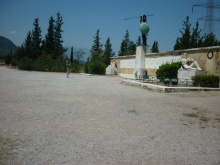
We had slightly more difficulty tracking down the battlefield, until I realised that the Rough Guide assumed we were approaching from the south; from Athens. So we drove on, about a hundred metres, and there they were, two huge and distinctly fascist monuments (if a Latin term may be excused). The Hill of Kolonos, the burial mound that reaches to the stars*, stood across the road. There were two cars in the car park, counting ours. The services complex off in the distance didn't look to be doing much business. Boy-racers had left their aimless tracks across the salt pan at the foot of the hill. Despite the beribboned wreaths** on the monument steps, everything seemed deserted: ancient history trapped in a half-built motorway intersection. We climbed the Hill of Kolonus, paid our respects, and ate our lunch of bread and honey, cheese and boiled eggs, & 2 superb peaches, in a hollow in the spiny-oak scrub; not far from the current version of the tablet that reads
Stranger, go tell the Spartans that here we lie...
Here I am, I thought. Finally: in the place that has meant so much to me, for forty years or more. Go and tell the Spartans, someone.
Why so much personal meaning? It's a great story, and quite possibly the third day sacrifice of the rearguard here, actually
did change the course of that particulat war: allowing the Athenians a little more time to evacuate; giving Themistocles a breathing space and a second chance at
that vital naval victory. But how can I know that the good guys even won, at Salamis, after all this time? The Spartans, for instance, were absolute b*****ds when they were at home.
Fascist is a polite word for the way they carried on... And the Athenians were no better than they should be. The word
Thermopylae means something different to me. It has evolved. It means a poem by Cavafy, that I met when I was an undergraduate, a expatriate Greek's austere, modernist concept of heroism. The sober business of recognising a just cause and sticking to it, even if you know you can't possibly win. Even if you know (
as many do forsee, as Cavafy says) that might is sure to triumph in the end.
Honor to those who in their life
Set out and guard Thermopylae.
Never wavering from duty;
just and forthright in all their actions,
though yet with mercy and compassion;
generous when rich, and when
poor, still in small measure generous,
helping again, as they can;
always speaking forth the truth,
yet without malice for the deceitful.
A higher honour indeed is due
when they foresee (as many do)
that Ephialtes will in the end appear,
and the Medes will eventually break through.
C.P.Cavafy trs Evangelos Sachperolou
The next stage was exhausting. We made a mistake, when trying to leave Thermopylae, made another mistake when trying to undo the first, and had to climb all the way up the mountains (the views over the Gulf were stupendous), on a single track road with no turning places. Worse still, when we reached the village of Karia, high up in the sky in the middle of nowhere and dead to the world, there was no way down the other side except via alarming-looking, unsurfaced, dirt tracks. So we turned and drove all the way back to the Thermopylae junction, & saw what we ought to have done at once (its often the way). The roads were good and played no tricks from then on, from Thermopylae to Regini, via Modi and Kato Tithorea. Cheronia (ancient Chaeronea) took us by surprise. It was
roasting hot. We bought ice creams from a supermarket man who unpadlocked his freezer for us, and told us the antiquities were just on down the road. We ate our ices, with cold lemonade from a kiosk (best ice I've ever tasted) outside an aestivating cafe, and drove on. Here, in 338 BCE, a hundred and forty years or so after Thermopylae, the dream of the city states, that the Spartans died for, died itself, under the onslaught of Philip of Macedon's ambition (with a little help from his son). What we had come to see was hard to miss: a 6 metre tall white marble lion, raised by Alexander himself, they say, to honour the Theban Band, that army of lovers, who died here "to a man". He probably slaughtered some of them himself, personally, but I'm sure they'd still have appreciated the gesture. Blokes are like that.
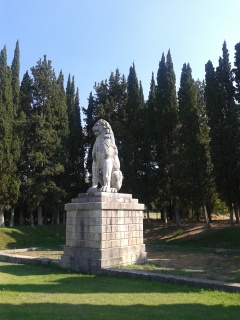
Reports differ, maybe some of the lovers survived; maybe the Thebans paid for the lion, and Philip and Alexander just graciously allowed them to honour their dead. But still, lost for centuries, dug up by Ali Pasha (he couldn't get it transported to Ioannina), admired by Byron in its fallen glory, the white lion has been restored, patched together and replaced on its pedestal. It stands in the middle of a green lawn where the Theban Band are buried, surrounded by cypress trees. It's a very nice lion. We liked it a lot. "This is the end of the Philip of Macedon trail," I told Peter. "The end of what he did to Greece, anyway." And we stayed there for a while. Nobody else came by.
*The philosopher Apollonios Tyanefs (1st century CE) was once asked, which is the highest mountain in the world, and he replied: "Kolonos is the highest mountain in the world, because on this mountain law keeping and noble self-sacrifice have put up a monument, which has its base on the earth and reaches the stars".
**I didn't look too closely at the wreaths. I feared they were fresh, and sentiments expressed on those blue and white ribbons might be a little to the right of Nationalist. If you know what I mean.


 We left Guesthouse Euridiki very early on St Paraskevi's day. Goodbye to our hostess, and her quiet husband. Goodbye the cool, hushed lobby with the ranked preserves and the craft goods nobody bought; goodbye Elia's Corner. By ten thirty we'd reached Sacred Dion, at the foot of Mount Olympus. One more Macedonian city, but not an architect designed show-off from the World Domination years, like Pella: a city that just grew, the way proper cities ought, around the national shrines. A lovely, unexpected place. The ruins, mostly Graeco-Roman, first century CE, inhabit a shady wetland, hopping with bright green frogs. The deities, Demeter, Zeus, Afrodite, have been replaced (effigies of effigies) just as they were found: small, not gigantic, presiding over the dragonflies. In the museum where the originals are kept we saw portrait statues of ordinary bourgeois, men and women, neither royal nor divine (that's Rome for you), and a beautiful, remarkably well preserved "hydraulis": water-powered harmonium for public entertainments. The silent movie cinema had not survived.
We left Guesthouse Euridiki very early on St Paraskevi's day. Goodbye to our hostess, and her quiet husband. Goodbye the cool, hushed lobby with the ranked preserves and the craft goods nobody bought; goodbye Elia's Corner. By ten thirty we'd reached Sacred Dion, at the foot of Mount Olympus. One more Macedonian city, but not an architect designed show-off from the World Domination years, like Pella: a city that just grew, the way proper cities ought, around the national shrines. A lovely, unexpected place. The ruins, mostly Graeco-Roman, first century CE, inhabit a shady wetland, hopping with bright green frogs. The deities, Demeter, Zeus, Afrodite, have been replaced (effigies of effigies) just as they were found: small, not gigantic, presiding over the dragonflies. In the museum where the originals are kept we saw portrait statues of ordinary bourgeois, men and women, neither royal nor divine (that's Rome for you), and a beautiful, remarkably well preserved "hydraulis": water-powered harmonium for public entertainments. The silent movie cinema had not survived. Reports differ, maybe some of the lovers survived; maybe the Thebans paid for the lion, and Philip and Alexander just graciously allowed them to honour their dead. But still, lost for centuries, dug up by Ali Pasha (he couldn't get it transported to Ioannina), admired by Byron in its fallen glory, the white lion has been restored, patched together and replaced on its pedestal. It stands in the middle of a green lawn where the Theban Band are buried, surrounded by cypress trees. It's a very nice lion. We liked it a lot. "This is the end of the Philip of Macedon trail," I told Peter. "The end of what he did to Greece, anyway." And we stayed there for a while. Nobody else came by.
Reports differ, maybe some of the lovers survived; maybe the Thebans paid for the lion, and Philip and Alexander just graciously allowed them to honour their dead. But still, lost for centuries, dug up by Ali Pasha (he couldn't get it transported to Ioannina), admired by Byron in its fallen glory, the white lion has been restored, patched together and replaced on its pedestal. It stands in the middle of a green lawn where the Theban Band are buried, surrounded by cypress trees. It's a very nice lion. We liked it a lot. "This is the end of the Philip of Macedon trail," I told Peter. "The end of what he did to Greece, anyway." And we stayed there for a while. Nobody else came by.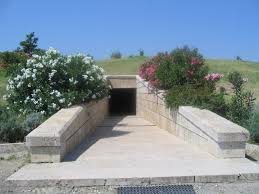 Vergina is a single work art-show, for the present. The Royal Palace, extensive and tantalising, is closed for refurbishment. All you can see is the tombs. The museum, what a brilliant idea, has been built on site, and a Tumulus mound raised over it: so that you enter, as the funeral processions would have done, via a sloping tunnel; into darkness, glimpsing the ghostly white sunken doors of the houses of the dead.
Vergina is a single work art-show, for the present. The Royal Palace, extensive and tantalising, is closed for refurbishment. All you can see is the tombs. The museum, what a brilliant idea, has been built on site, and a Tumulus mound raised over it: so that you enter, as the funeral processions would have done, via a sloping tunnel; into darkness, glimpsing the ghostly white sunken doors of the houses of the dead. 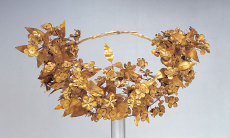 It didn't take long to walk around. Here are the famous, fabulously delicate gold wreaths, oak and myrtle. The silver and bronze vessels; the outsize bathing utensils for the funerary rites of a king. The metal parts of a king's dress armour (Philip wasn't a big man, apparently). A solid gold larnax ; funerary container, in which they found the charred fragments of a middle aged man's bones, wrapped in purple. A "queen's diadem".
It didn't take long to walk around. Here are the famous, fabulously delicate gold wreaths, oak and myrtle. The silver and bronze vessels; the outsize bathing utensils for the funerary rites of a king. The metal parts of a king's dress armour (Philip wasn't a big man, apparently). A solid gold larnax ; funerary container, in which they found the charred fragments of a middle aged man's bones, wrapped in purple. A "queen's diadem". 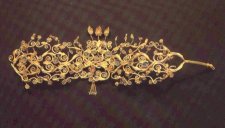 The tiny ivory portrait heads, recognisable as Philip and his son, from a chryselephantine dining couch. The tombs themselves, Philip's with the Doric facade, and the wonderful painted hunting scene above the door. The fascinating doll's house reconstructions: showing exactly what Manolis and his team saw, when they broke in, thirty years ago. The treasure of massive metal, jumbled anyhow; the imperishable gleam of gold.
The tiny ivory portrait heads, recognisable as Philip and his son, from a chryselephantine dining couch. The tombs themselves, Philip's with the Doric facade, and the wonderful painted hunting scene above the door. The fascinating doll's house reconstructions: showing exactly what Manolis and his team saw, when they broke in, thirty years ago. The treasure of massive metal, jumbled anyhow; the imperishable gleam of gold. 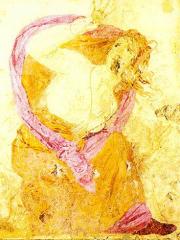 The Rape of Persephone is a true fresco, executed swiftly on wet plaster, with great freedom and virtuoso skill. The colours seem to be intact, and used sparingly. On the eastern wall, Demeter sits on a rock, as she is described in the Mysteries of Eleusis, exhausted and desolate. To her left, there's the abduction itself. It made the hairs stand on the back of my neck. There is nothing else like this. No other greek painting of this quality and completeness has survived, and yet I've seen that attendant nymph, looking so bewildered and dumbfounded, clutching the veil. She's in the young Cézanne's
The Rape of Persephone is a true fresco, executed swiftly on wet plaster, with great freedom and virtuoso skill. The colours seem to be intact, and used sparingly. On the eastern wall, Demeter sits on a rock, as she is described in the Mysteries of Eleusis, exhausted and desolate. To her left, there's the abduction itself. It made the hairs stand on the back of my neck. There is nothing else like this. No other greek painting of this quality and completeness has survived, and yet I've seen that attendant nymph, looking so bewildered and dumbfounded, clutching the veil. She's in the young Cézanne's  In the afternoon we walked around the fields, inspected the fatal theatre (all grass grown) and viewed the huge area of the Palace, closed off until at least 2017. Goats rambled, scarlet-skirted grasshoppers leapt onto us. We discussed the Pausanius story, the smoking gun and the grassy knoll and the obvious conclusion one must draw. There was a lot of handwaving at the time, about this poor disturbed young man, unjustly treated by his powerful lover; Philip's bad habit of playing his gorgeous bodyguards off against each other, etc etc. But there was CSI evidence that Pausanius had expected to get away with his crime of passion. That just doesn't make sense. Unless somebody (and there's really only one person who could have done this) had convinced him he'd survive. . . Peter spotted a wayside shrub bearing woody fruits; exactly the same little etched, ochre roundels we'd seen featuring in the funeral wreaths worn by the living, some of them found intact in 2,500 year old funeral debris. I looked it up, later. It's called the
In the afternoon we walked around the fields, inspected the fatal theatre (all grass grown) and viewed the huge area of the Palace, closed off until at least 2017. Goats rambled, scarlet-skirted grasshoppers leapt onto us. We discussed the Pausanius story, the smoking gun and the grassy knoll and the obvious conclusion one must draw. There was a lot of handwaving at the time, about this poor disturbed young man, unjustly treated by his powerful lover; Philip's bad habit of playing his gorgeous bodyguards off against each other, etc etc. But there was CSI evidence that Pausanius had expected to get away with his crime of passion. That just doesn't make sense. Unless somebody (and there's really only one person who could have done this) had convinced him he'd survive. . . Peter spotted a wayside shrub bearing woody fruits; exactly the same little etched, ochre roundels we'd seen featuring in the funeral wreaths worn by the living, some of them found intact in 2,500 year old funeral debris. I looked it up, later. It's called the 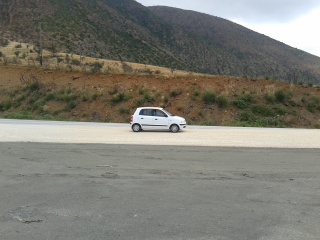 When I first planned this tour around the Roumeli, I imagined we'd use public transport: reliving the intimacy and the drama of our tour of Java and Sumatra in 1978. You have to get to know the people, and you have to speak the language, when you're stranded with a bunch of them at a houseless railway junction in black night, in the deepest, darkest Sumatran rainforest, and the scheduled bus doesn't turn up... (Don't try this today. The forest is gone, for one thing). But then I found out
When I first planned this tour around the Roumeli, I imagined we'd use public transport: reliving the intimacy and the drama of our tour of Java and Sumatra in 1978. You have to get to know the people, and you have to speak the language, when you're stranded with a bunch of them at a houseless railway junction in black night, in the deepest, darkest Sumatran rainforest, and the scheduled bus doesn't turn up... (Don't try this today. The forest is gone, for one thing). But then I found out 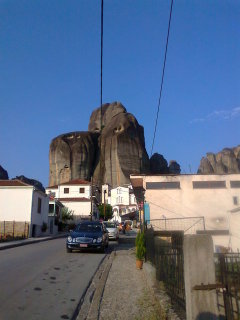 this extraordinary landscape. The pioneer was apparently St Athanasius, riding on the back of an eagle. The labyrinthine Orthodox lamaseries that followed were constructed and supplied by rope and tackle. In living (tourist) memory it was still quite an adventure to get access. Today, fierce and squalid isolation is no more. There are stairways. Custodians take your money, dispense natty monochrome pareos for decency if necessary, and conduct you to the dark, livid, painted sancturaries, every niche and corner teeming with inventive means of execution. The paintings at Ayiou Nikolau Anapafsa, work of a Cretan, a contemporary of El Greco are far and away the best. The tiny 9th century painted cathedral down in the town is worth the lot of them: unless you're just here for the thrill of peering off the edge of a sheer, 100+ metre drop, and imagining you might fall. Not many people stay.Coachloads upon coachloads of devout Russians, Bulgarians, Romanians, process up the precipitous single track road, pour off their buses, climb the stairs, obsessively venerate every icon in sight, pour back onto their buses and do the same at the next lamasery along. At 3 euros a pop, this operation must be a regular goldmine.
this extraordinary landscape. The pioneer was apparently St Athanasius, riding on the back of an eagle. The labyrinthine Orthodox lamaseries that followed were constructed and supplied by rope and tackle. In living (tourist) memory it was still quite an adventure to get access. Today, fierce and squalid isolation is no more. There are stairways. Custodians take your money, dispense natty monochrome pareos for decency if necessary, and conduct you to the dark, livid, painted sancturaries, every niche and corner teeming with inventive means of execution. The paintings at Ayiou Nikolau Anapafsa, work of a Cretan, a contemporary of El Greco are far and away the best. The tiny 9th century painted cathedral down in the town is worth the lot of them: unless you're just here for the thrill of peering off the edge of a sheer, 100+ metre drop, and imagining you might fall. Not many people stay.Coachloads upon coachloads of devout Russians, Bulgarians, Romanians, process up the precipitous single track road, pour off their buses, climb the stairs, obsessively venerate every icon in sight, pour back onto their buses and do the same at the next lamasery along. At 3 euros a pop, this operation must be a regular goldmine.  Tuesday 3rd September, light cloud, light breeze: feeling cooler. Trying to encourage happy thoughts and positive energy in the world, when all I hear is bad news, I've decided to list some of my favourite things of the moment. In no particular order, so take no notice of the numbers, it's just a convention.
Tuesday 3rd September, light cloud, light breeze: feeling cooler. Trying to encourage happy thoughts and positive energy in the world, when all I hear is bad news, I've decided to list some of my favourite things of the moment. In no particular order, so take no notice of the numbers, it's just a convention. speaking greek. Except to yell BEAVER! once (rather surprising announcement!) at which the two musk rats who'd been calmly watching our approach from the bank very swiftly took themselves off... Never mind, I love kayaking, & it was very peaceful and nice. The Penduline Tits were ace too. Their nests are really cool. (
speaking greek. Except to yell BEAVER! once (rather surprising announcement!) at which the two musk rats who'd been calmly watching our approach from the bank very swiftly took themselves off... Never mind, I love kayaking, & it was very peaceful and nice. The Penduline Tits were ace too. Their nests are really cool. (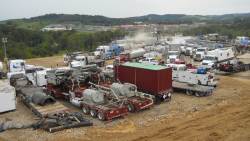 Tuesday 27th August, another warm sunny afternoon & I meant to post this yesterday, but I was sidetracked, by the Transparency of Lobbying Bill ironically enough.
Tuesday 27th August, another warm sunny afternoon & I meant to post this yesterday, but I was sidetracked, by the Transparency of Lobbying Bill ironically enough. 
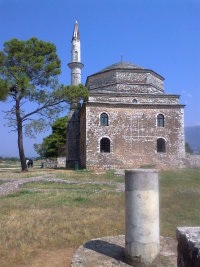 Friday 16th August, grey skies, cool air and a soft rain through the morning; warmth and light coming through now. Coincidentally, grey skies, cool air and a full-on thunderstorm met us in Ioannina, Western Greece last month, the day before this photograph was taken, which we hadn't expected. I love thunderstorms, so I didn't mind at all.
Friday 16th August, grey skies, cool air and a soft rain through the morning; warmth and light coming through now. Coincidentally, grey skies, cool air and a full-on thunderstorm met us in Ioannina, Western Greece last month, the day before this photograph was taken, which we hadn't expected. I love thunderstorms, so I didn't mind at all.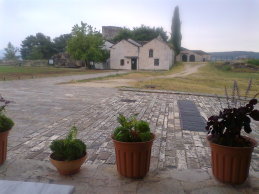 Keynote image is the serai mosque, inner citadel of Ali Pasha (Byron was here, in amazing number of costume changes, circa 1809). This is another shot of the same place, in the rain, taken from the Byzantine Museum restaurant terrace. Nice time there. Once or twice on our travels I meditated a foreign correspondent blog post, but the Wifi was just too shaky. I'm still meditating publishing an account of our tour around the Roumeli here. We had some brilliant experiences. Maybe I'll get round to it.
Keynote image is the serai mosque, inner citadel of Ali Pasha (Byron was here, in amazing number of costume changes, circa 1809). This is another shot of the same place, in the rain, taken from the Byzantine Museum restaurant terrace. Nice time there. Once or twice on our travels I meditated a foreign correspondent blog post, but the Wifi was just too shaky. I'm still meditating publishing an account of our tour around the Roumeli here. We had some brilliant experiences. Maybe I'll get round to it.
 Wednesday 26th June. Blue sky fading to white, one swift hurrying for the horizon at 9.15, obviously late for work. Getting cooler again. It's past midsummer and did you know there is still snow enough to ski on Ben Nevis? Wow. Anyway, it's my cat Ginger's birthday, she is twelve, so I thought I'd celebrate with a bouncing totoro.
Wednesday 26th June. Blue sky fading to white, one swift hurrying for the horizon at 9.15, obviously late for work. Getting cooler again. It's past midsummer and did you know there is still snow enough to ski on Ben Nevis? Wow. Anyway, it's my cat Ginger's birthday, she is twelve, so I thought I'd celebrate with a bouncing totoro. 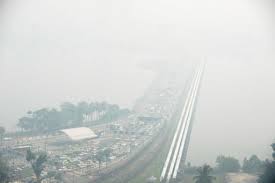 Friday 21st June. Sumatra's burning again. The blaze must be quite a size, given the effects in Singapore and Malaysia, and cynic that I am, I'm thinking, that's not the small landowners, it's the Palm Oil firms, kind of accidentally getting rid of the annoying scraps of stuff still been getting in their way... I am heartsick, and I'm muttering, I didn't know there was that much rainforest left. But what do I know? & Jakarta makes no apology, there's a surprise. Photo courtesy of the
Friday 21st June. Sumatra's burning again. The blaze must be quite a size, given the effects in Singapore and Malaysia, and cynic that I am, I'm thinking, that's not the small landowners, it's the Palm Oil firms, kind of accidentally getting rid of the annoying scraps of stuff still been getting in their way... I am heartsick, and I'm muttering, I didn't know there was that much rainforest left. But what do I know? & Jakarta makes no apology, there's a surprise. Photo courtesy of the  On Wednesday it was summer, did you notice? We sat out late and watched the swifts, swarming in a pure blue evening sky. Now there's a cold persistent mist outside my window, and the full moon of the solstice has been cancelled, I'm afraid.
On Wednesday it was summer, did you notice? We sat out late and watched the swifts, swarming in a pure blue evening sky. Now there's a cold persistent mist outside my window, and the full moon of the solstice has been cancelled, I'm afraid.  Sunday 16th June, blue skies after morning drizzle. Just back from the
Sunday 16th June, blue skies after morning drizzle. Just back from the 
